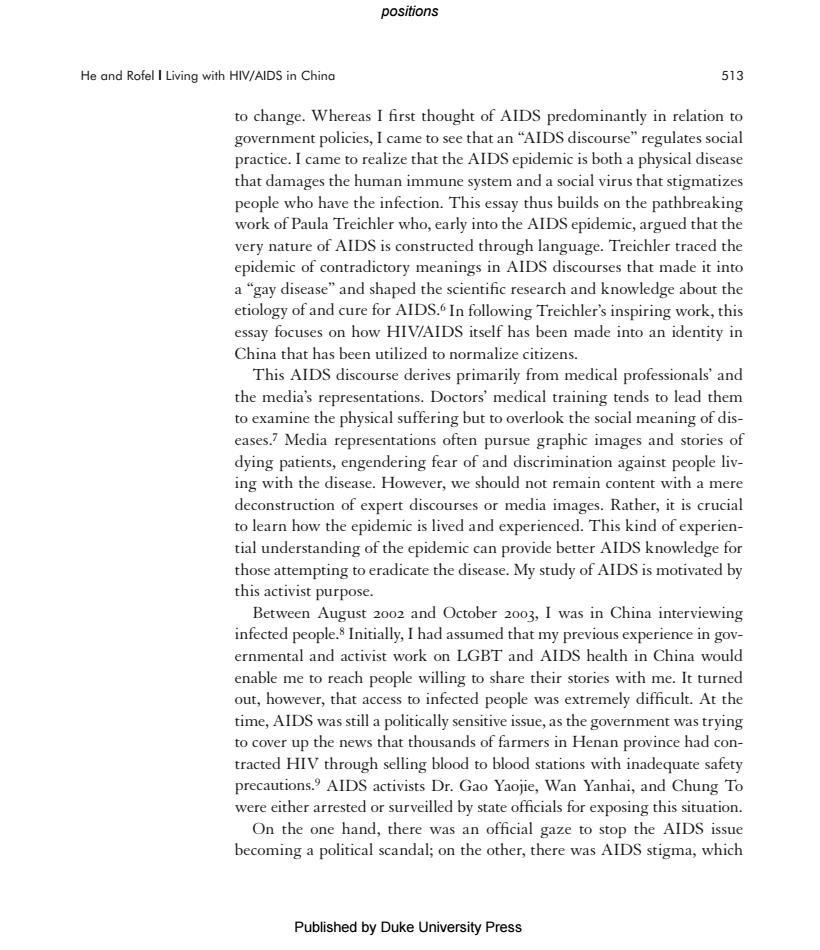正在加载图片...

positions He and Rofel I Living with HIV/AIDS in China 513 to change.Whereas I first thought of AIDS predominantly in relation to government policies,I came to see that an"AIDS discourse"regulates social practice.I came to realize that the AIDS epidemic is both a physical disease that damages the human immune system and a social virus that stigmatizes people who have the infection.This essay thus builds on the pathbreaking work of Paula Treichler who,early into the AIDS epidemic,argued that the very nature of AIDS is constructed through language.Treichler traced the epidemic of contradictory meanings in AIDS discourses that made it into a"gay disease"and shaped the scientific research and knowledge about the etiology of and cure for AIDS.In following Treichler's inspiring work,this essay focuses on how HIV/AIDS itself has been made into an identity in China that has been utilized to normalize citizens. This AIDS discourse derives primarily from medical professionals'and the media's representations.Doctors'medical training tends to lead them to examine the physical suffering but to overlook the social meaning of dis- eases.?Media representations often pursue graphic images and stories of dying patients,engendering fear of and discrimination against people liv- ing with the disease.However,we should not remain content with a mere deconstruction of expert discourses or media images.Rather,it is crucial to learn how the epidemic is lived and experienced.This kind of experien- tial understanding of the epidemic can provide better AIDS knowledge for those attempting to eradicate the disease.My study of AIDS is motivated by this activist purpose. Between August 2002 and October 2003,I was in China interviewing infected people.s Initially,I had assumed that my previous experience in gov- ernmental and activist work on LGBT and AIDS health in China would enable me to reach people willing to share their stories with me.It turned out,however,that access to infected people was extremely difficult.At the time,AIDS was still a politically sensitive issue,as the government was trying to cover up the news that thousands of farmers in Henan province had con- tracted HIV through selling blood to blood stations with inadequate safety precautions.AIDS activists Dr.Gao Yaojie,Wan Yanhai,and Chung To were either arrested or surveilled by state officials for exposing this situation. On the one hand,there was an official gaze to stop the AIDS issue becoming a political scandal;on the other,there was AIDS stigma,which Published by Duke University PressHe and Rofel ❘ Living with HIV/AIDS in China 513 to change. Whereas I first thought of AIDS predominantly in relation to government policies, I came to see that an “AIDS discourse” regulates social practice. I came to realize that the AIDS epidemic is both a physical disease that damages the human immune system and a social virus that stigmatizes people who have the infection. This essay thus builds on the pathbreaking work of Paula Treichler who, early into the AIDS epidemic, argued that the very nature of AIDS is constructed through language. Treichler traced the epidemic of contradictory meanings in AIDS discourses that made it into a “gay disease” and shaped the scientific research and knowledge about the etiology of and cure for AIDS.6 In following Treichler’s inspiring work, this essay focuses on how HIV/AIDS itself has been made into an identity in China that has been utilized to normalize citizens. This AIDS discourse derives primarily from medical professionals’ and the media’s representations. Doctors’ medical training tends to lead them to examine the physical suffering but to overlook the social meaning of diseases.7 Media representations often pursue graphic images and stories of dying patients, engendering fear of and discrimination against people living with the disease. However, we should not remain content with a mere deconstruction of expert discourses or media images. Rather, it is crucial to learn how the epidemic is lived and experienced. This kind of experiential understanding of the epidemic can provide better AIDS knowledge for those attempting to eradicate the disease. My study of AIDS is motivated by this activist purpose. Between August 2002 and October 2003, I was in China interviewing infected people.8 Initially, I had assumed that my previous experience in governmental and activist work on LGBT and AIDS health in China would enable me to reach people willing to share their stories with me. It turned out, however, that access to infected people was extremely difficult. At the time, AIDS was still a politically sensitive issue, as the government was trying to cover up the news that thousands of farmers in Henan province had contracted HIV through selling blood to blood stations with inadequate safety precautions.9 AIDS activists Dr. Gao Yaojie, Wan Yanhai, and Chung To were either arrested or surveilled by state officials for exposing this situation. On the one hand, there was an official gaze to stop the AIDS issue becoming a political scandal; on the other, there was AIDS stigma, which positions Published by Duke University Press